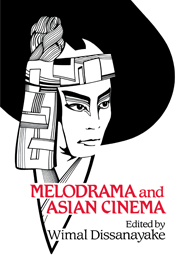Book contents
- Frontmatter
- Contents
- List of contributors
- Acknowledgments
- I Introduction
- II Melodrama / subjectivity / ideology: Western melodrama theories and their relevance to recent Chinese cinema
- III Symbolic representation and symbolic violence: Chinese family melodrama of the early 1980s
- IV The Goddess: Reflections on melodrama East and West
- V Melodrama as historical understanding: The making and unmaking of communist history
- VI Melodrama, postmodernism, and Japanese cinema
- VII Inscribing the subject: The melodramatization of gender in An Actor's Revenge
- VIII Insides and outsides: Cross-cultural criticism and Japanese film melodrama
- IX Psyches, ideologies, and melodrama: The United States and Japan
- X Negotiating the transition to capitalism: The case of Andaz
- XI The concepts of evil and social order in Indian melodrama: An evolving dialectic
- XII Politics of melodrama in Indonesian cinema
- XIII Power, pleasure, and desire: The female body in Filipino melodrama
- XIV The register of nightmare: Melodrama as it (dis)appears in Australian film
- XV Overview: What is American about film study in America?
- Index
X - Negotiating the transition to capitalism: The case of Andaz
Published online by Cambridge University Press: 05 June 2012
- Frontmatter
- Contents
- List of contributors
- Acknowledgments
- I Introduction
- II Melodrama / subjectivity / ideology: Western melodrama theories and their relevance to recent Chinese cinema
- III Symbolic representation and symbolic violence: Chinese family melodrama of the early 1980s
- IV The Goddess: Reflections on melodrama East and West
- V Melodrama as historical understanding: The making and unmaking of communist history
- VI Melodrama, postmodernism, and Japanese cinema
- VII Inscribing the subject: The melodramatization of gender in An Actor's Revenge
- VIII Insides and outsides: Cross-cultural criticism and Japanese film melodrama
- IX Psyches, ideologies, and melodrama: The United States and Japan
- X Negotiating the transition to capitalism: The case of Andaz
- XI The concepts of evil and social order in Indian melodrama: An evolving dialectic
- XII Politics of melodrama in Indonesian cinema
- XIII Power, pleasure, and desire: The female body in Filipino melodrama
- XIV The register of nightmare: Melodrama as it (dis)appears in Australian film
- XV Overview: What is American about film study in America?
- Index
Summary
The critical recovery of Douglas Sirk's work in the early 1970s sparked a renewal of interest in melodrama in film studies and in popular culture theories. Subsequently, under the impetus of a certain genre of feminist cultural politics, allied with an emphasis on the complexities of consumption (not to say consumerism) and a desire to reevaluate areas of cultural production of which women were said to be the dominant consumers, this interest in cinematic melodrama was extended to the discussion – and in my view the positive valuation – of soap operas and of written romances. Unfortunately, all this work has concerned itself exclusively (except in some Latin American countries – and that work has not been translated and widely circulated because of it) with the products of the Anglo-Saxon media monopolies in film and television as well as in publishing. And these discussions have systematically neglected to see those cultural products and practices as part and parcel of “advanced industrial” media monopolies and their efforts to dominate a global market.
The relations between texts and viewers or consumers have also been discussed exclusively within that framework, without taking any notice of its place and function within strategies for world market domination. The Latin American work on telenovelas (e.g., the work of Michelle Mattelart [1986]) is not taken into account in any of the major books on melodrama, and neither is the work by Chinese critics on Hong Kong melodrama.
- Type
- Chapter
- Information
- Melodrama and Asian Cinema , pp. 179 - 188Publisher: Cambridge University PressPrint publication year: 1993
- 13
- Cited by

